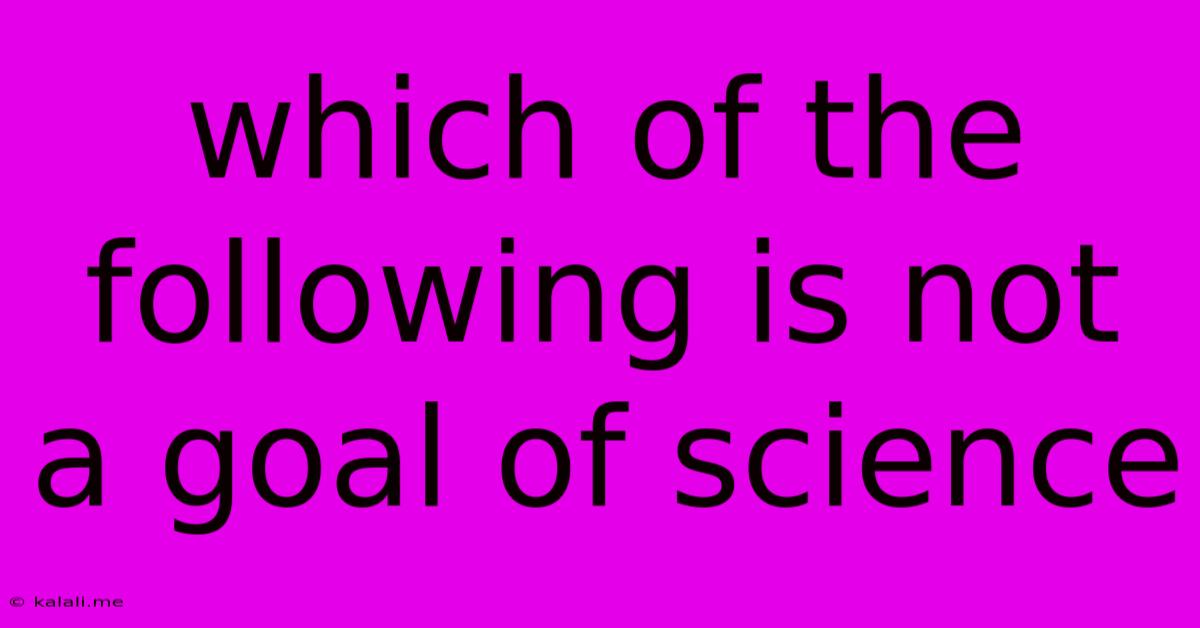Which Of The Following Is Not A Goal Of Science
Kalali
Jun 15, 2025 · 3 min read

Table of Contents
Which of the following is NOT a goal of science? Understanding the Scientific Method and its Aims
Science, at its core, is a systematic approach to understanding the natural world. It's a process driven by curiosity, observation, and a relentless pursuit of knowledge. But what exactly is the goal of science? This article will explore the core aims of scientific inquiry and identify what falls outside its purview. We'll dissect the common misconceptions and clarify the true objectives of the scientific method.
What Science Does Aim To Do:
The primary goals of science can be summarized as follows:
-
To describe the natural world: This involves detailed observation and accurate measurement of phenomena. Scientists strive to create comprehensive descriptions of the world around us, from the smallest subatomic particles to the largest galaxies. This includes identifying patterns and relationships between different observable elements.
-
To explain the natural world: Science seeks to provide explanations for why things happen the way they do. These explanations are often expressed as theories or models, which are based on evidence and can be tested through experimentation. The best scientific explanations are predictive – allowing us to anticipate future events.
-
To predict future events: Based on observed patterns and established theories, science aims to forecast future occurrences. This is crucial in fields like meteorology, seismology, and epidemiology. The accuracy of these predictions is often a key measure of the strength of a scientific model.
-
To control and manipulate natural phenomena: This is the applied aspect of science, using our understanding of the natural world to achieve specific goals. This ranges from developing new technologies to improving agricultural yields and managing environmental challenges. Control, however, is always guided by ethical considerations and a recognition of potential unforeseen consequences.
What Science Does Not Aim To Do:
While science strives for objectivity and evidence-based conclusions, it's important to understand its limitations. Science does not aim to:
-
Prove absolute truths: Science operates on the basis of evidence and probability, not absolute certainty. Scientific understanding is constantly evolving as new evidence emerges and our models are refined. Theories are subject to revision or even replacement if new data warrants it. The inherent nature of scientific investigation prevents it from definitively proclaiming absolute truths.
-
Answer all questions: Science is confined to the study of the natural world, using empirical methods and testable hypotheses. Questions of morality, ethics, aesthetics, or the supernatural fall outside the scope of scientific inquiry. While science can inform discussions on these topics, it cannot provide definitive answers.
-
Provide moral guidance or dictate values: Science provides information and understanding, but it does not prescribe values or dictate ethical actions. The application of scientific knowledge is influenced by human values and ethical considerations, which are distinct from the scientific process itself. Ethical debates regarding the use of scientific advancements are critical and separate from the science itself.
-
Create a perfect or utopian world: Science is a tool, and like any tool, it can be used for good or ill. While science can contribute to improving the human condition, it cannot guarantee a perfect or utopian world. Social, economic, and political factors play a critical role in shaping societies, regardless of scientific progress.
In conclusion, understanding the goals – and limitations – of science is crucial for responsible scientific practice and informed public discourse. Science is a powerful tool for understanding and interacting with the natural world, but it's vital to recognize its boundaries and appreciate its ongoing quest for knowledge rather than absolute certainty.
Latest Posts
Latest Posts
-
The Krebs Cycle Is Also Called The
Jun 15, 2025
-
What Are The Multiples For 14
Jun 15, 2025
-
What Is The Factors Of 100
Jun 15, 2025
-
How Many Valence Electrons Are Present In Silicon
Jun 15, 2025
-
What Is The First Step In Planning
Jun 15, 2025
Related Post
Thank you for visiting our website which covers about Which Of The Following Is Not A Goal Of Science . We hope the information provided has been useful to you. Feel free to contact us if you have any questions or need further assistance. See you next time and don't miss to bookmark.